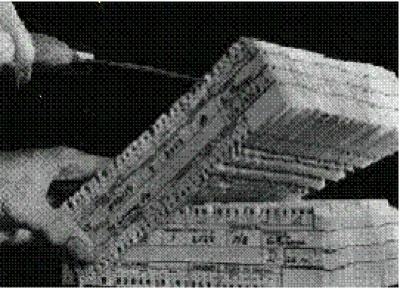
Kevin Kelly has a wonderfully detailed post about an organizational ‘hypercard’ system (with emphasis on the ‘card’) that as near as he can tell has gone extinct. Most interestingly Kelly posits that techno-extinction is actually a very rare thing:
Usually someone, somewhere will continue to employ the most ancient technology. There are probably more people making swords by hand now than in the past. On any given weekend in the US there will be a gathering of weekend flint knappers churning out mounds of magnificent arrow heads, using the exact technology of the stone age. Online you can buy new valves for a Stanley steam powered car, or leather parts for a horse drawn buggy, just as you could 100 years ago. In some parts of Africa and Asia any ancient tool is still manufactured in ancient ways. It is hard to find an old technology that is not available in any form any where on earth.
While I think that whole, evolved technologies going extinct is likely quite rare, my bet is that the record of the steps that got us to many of those technologies is rarer still. In fact if you take Kelly’s note above, that there are likely more people knapping arrowheads now than 40,000 year ago, he is likely right (on shear numbers, not per capita of course). But what about all the bad or inefficient techniques along the way to high quality knappery? Those are lost and unpracticed, just like the Indecks card system shown above, and many other dead computer media replaced by newer better versions. If we look at systems for organizing data now we can see a gradual lock in occurring toward relational databases (ackkk Oracle!). Once this paradigmatic lock in is complete, my bet is that many people will be using it well past its time of pure usefullness.
This loss of process is likely very widespread throughout all technologies, it often results in the final evolved technology surviving, but we often forget how we got there. Evidence of this is in the anecdotes of how a modern designer or engineer tries to improve an ancient system, only to find out that the ancient system is vastly superior (W. McDonough often cites the black Bedouin tent as an example, and S. Lansing has a similar story from Balinese water and agricultural systems). Until a technology is mature and standardized, which our digital tech is only beginning to be, we will continue to lose a lot of information stored on these obsolescing systems like Indecks.